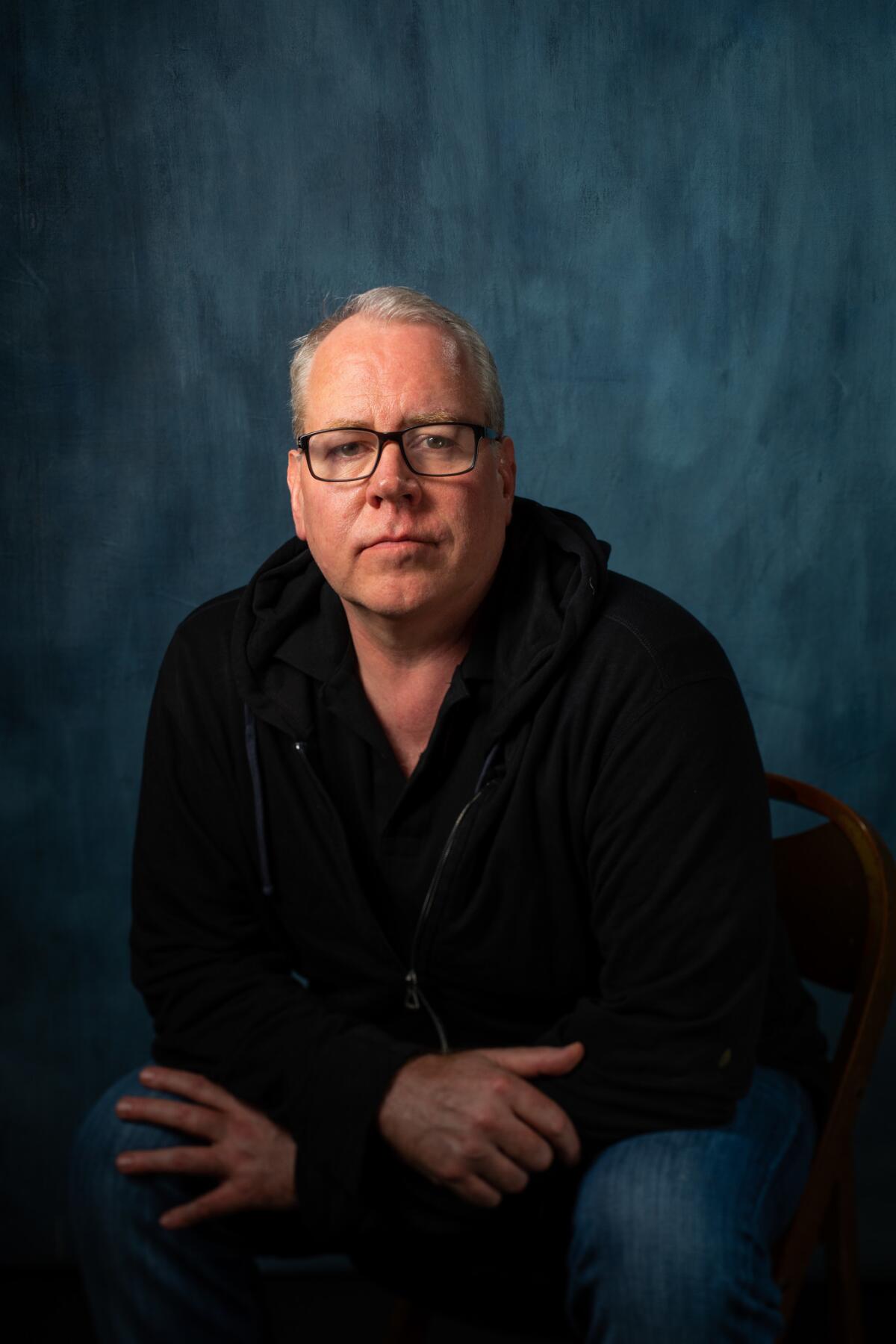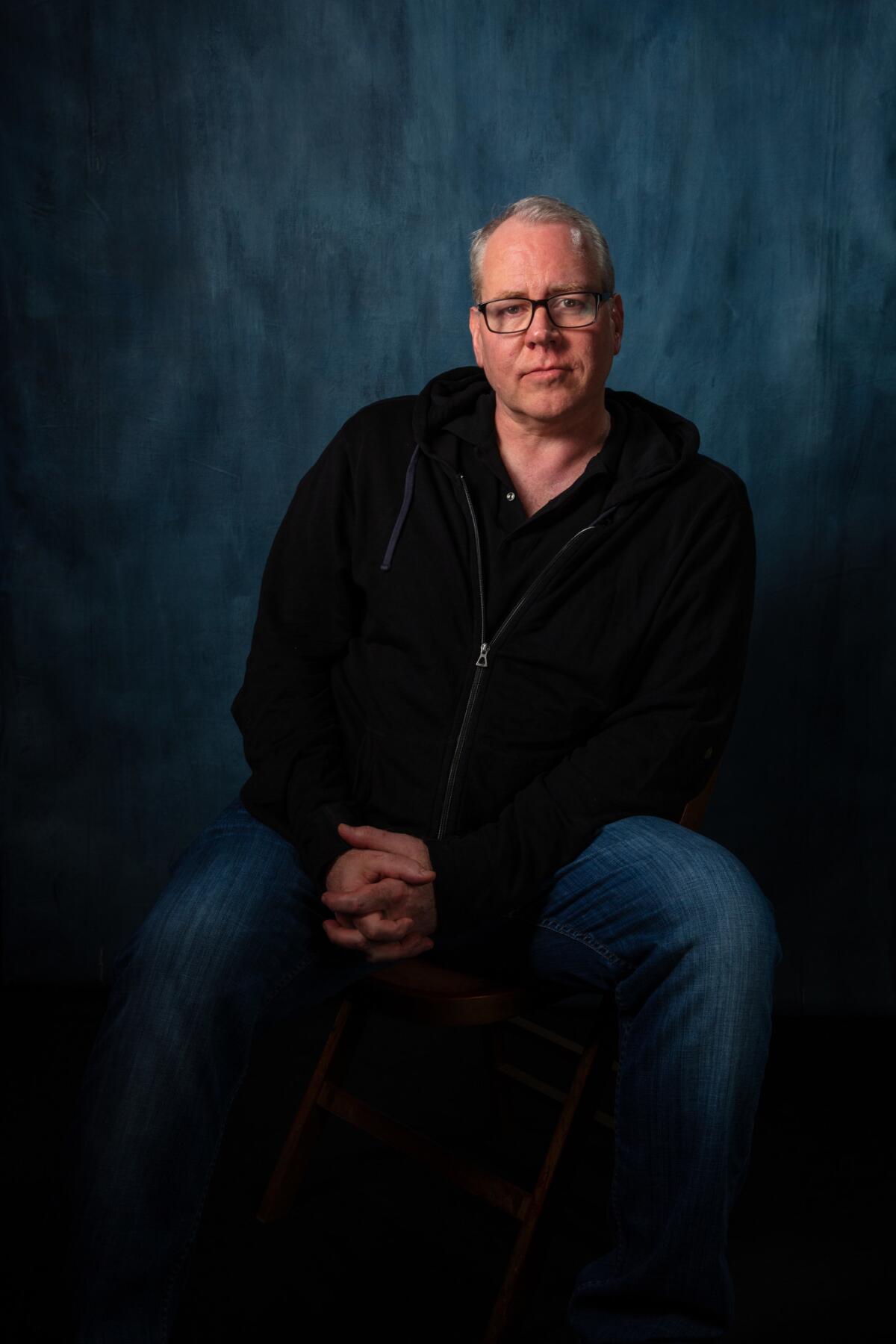Bret Easton Ellis on the New Yorker controversy: ‘I got punked’

Bret Easton Ellis talks about his book “White” at the L.A. Times Festival of Books.
Author Bret Easton Ellis is no stranger to controversy. This month, he told The Times: “You do see me going easier on Trump, though I have nothing in the book to align myself with him or his policies. Trump does not bother me more than what has been going on with the woke left.” Then, last week, he caused another uproar in an interview with the New Yorker.
With his latest release — and first work of nonfiction — “White,” Ellis challenged himself in a new way. The author and podcast host sat down for a video interview with Times staff writer Mark Olsen at the Los Angeles Times Festival of Books to discuss Ellis’ aversion to politics, his reaction to the New Yorker article, his love of Joan Didion and why he just might write another fiction book.
I know there was this big controversy last week with this New Yorker piece about me ... which was kind of a prank. I got punked.
— Bret Easton Ellis

As you’ve been talking about your new book, I think a lot of people have been wanting you to engage in politics. How do you feel about that? You’ve expressed that you feel you’re sort of over talking about President Trump. How do you feel about being asked to engage in politics talking about the new book?
Uncomfortable. I feel very uncomfortable about it because I’m not political. I have no interest in politics. I’m kind of an absurdist. I think politics are absurd. I had a boyfriend who ran gubernatorial campaigns. I saw firsthand what I didn’t like about the whole process. I’ve just been pretty apolitical my entire life. Yet I live with someone who is super political, super politically charged. And what is interesting is that though I don’t necessarily agree with his ideology and his take on things, I learn a lot from it. And I do see both sides of the aisle. I don’t live in a bubble; I live in a mixed world where I know people on one side of the aisle, I know people on the other side of the aisle and then I live with a very extreme person who’s way far on the other side.
You might say something that people aren’t going to like ... but if you believe in it, you have to stick to it. A lot of people are afraid to do that.
— Bret Easton Ellis
I feel uncomfortable about it and I know there was this big controversy last week with this New Yorker piece about me, a New Yorker interview, which was kind of a prank. I got punked, I have to admit it. But one of the questions was, I said, “I’m not political, why are we going here?” He said, “Well then you shouldn’t have written a political book.” I don’t see this book as political at all. I think I mention Trump in it far less than I mentioned him in “American Psycho,” which was the era that I first noticed Trump and first had problems with Trump. I think because I got that out of my system then, my boyfriend thinks I kind of have a laissez-faire attitude about it when I should be a lot angrier and upset about everything. Being upset about politics, you can get me there to a certain place, but I just don’t know how much they interest me as someone who’s an ironist.
And also quite honestly, this book was going to be called “A White Privileged Male,” which the book does talk about. Am I exempt in some ways from the hard realities of what happens when politics change gears, change hands?
[“White”] sparked something off in me to maybe go back to fiction again.
— Bret Easton Ellis
How do you respond to people who feel that all art is inherently political?
They’re right. Sure, you can look at my books and see them as very political works, especially “American Psycho” has been looked at as one. I see it as a more personal book, and I see it more as a book about a boy trying to become a man in a society he doesn’t really believe in. That to me seems to be a very universal story. I think that’s one of the reasons why the book has carried on. I don’t know if it’s the politics of late-century capitalism or [if] that really is what excites people so much about that book. I think there’s a style to that book, people talk about the style all the time. They talk about the extremity of the character. That seems to get people excited about the book. But I don’t know. Certainly “Glamorama,” which was an international thriller, there were politics involved, the main mystery stemmed from a political candidate’s aspirations, so I don’t know. But I don’t look at myself as a political writer.
Given that this is your first book of nonfiction, it’s kind of rooted in cultural criticism, and you’ve really been talking a lot about aesthetics over ideology. What is your thinking on that? Why do you like to elevate aesthetics over ideology?
I don’t know. My boyfriend asks me that all the time. He says, “Don’t you think that ideology is more important than aesthetics?” And he accused me of being a bit too hard-line about aesthetics. For some reason, as a writer, I’ve noticed that style is everything. You could have any character in the world, you could have the best story in the world, if you don’t have a voice selling it, if you don’t have a style, you really don’t have anything. I learned this as a writer very early on that voice and style are everything. Then you can sell whatever you want. I noticed this also in film, it’s just something that I’ve been very aware of.
I really talk about it only when it comes down to basically film on my podcast where I do talk about movies that I like that are basically more genre-driven than rooted in an ideology. A message movie for me is not as interesting as, say, the flourish of spectacle. And that’s something that interests me. I mean, I suppose you can have both, but I don’t know, I’m much more drawn to the purity of genre.
I do find aesthetics more interesting than ideology.
— Bret Easton Ellis
In particular with writing your first nonfiction book, were there any other authors that you were looking to for inspiration?
Of course Joan Didion, and “The White Album,” which my title’s kind of an homage to that because the book’s not about race or anything. The first title was the jokey title, “White Privileged Male,” but that even came from “The White Album,” which is my favorite collection of essays. Whenever I’m writing nonfiction I’ve always looked to Joan Didion really as my inspiration and can only get to a third of what she can do, and even that sounds high.
What is it about Didion that inspires you?
Style, belief in style. “Play It as It Lays,” which is a novel that she wrote, was the first time that I realized presentation means so much. The way that the characters in that book, for example, are not particularly that interesting. The world is Hollywood, we know it. But the way that it’s stylized and in these short chapters and these terse sentences.
The mood and the atmosphere of that book kind of become overwhelming regardless of the relentlessness of the narrator and some of the terrible things that happen. It just seemed that presentation was as powerful as narrative. That gets back to aesthetics versus ideology. I do find aesthetics more interesting than ideology. But I would have to say that Didion’s style, and she was famously contrarian, she really was and it was very brave. I didn’t agree with everything that she wrote, but she was very brave to be especially a female journalist at a time where that was not the norm. She was tough. She was really tougher than most of the men of that era, who almost sometimes seemed like babies in comparison to her steely resolve and how she saw things and especially how cleanly she laid things out. So that was just my dream of how to present myself, and I don’t come anywhere near that.
What’s maybe the most unexpected thing you learned in writing the new book?
The most unexpected thing was that even though this is nonfiction, I pulled a lot of stuff from my podcasts, a couple of things I’d written in the past, and I put it together in this book. It was not just a collection of essays, a collection of podcasts that I did. It was actually, I was shocked, a literary experience. It’s nonfiction, but I realized I was approaching it like I approach a novel — I wanted it to flow; I wanted it to have a beginning, a middle, an end; I wanted it to peak at a certain place. So everything that I learned writing fiction, I was applying to this essay, this eight-part essay. That was unexpected.
What was even more unexpected is that it sparked something off in me to maybe go back to fiction again. I did not think that that was a possibility. So I started thinking about this new novella, and maybe I shouldn’t overthink the book because it took me a very long time to write many of my novels, and maybe to just do a really fast one that’s fun that’s maybe for people instead of just for myself, and I’m still toying with that. But that was a very unexpected thing.

What does creativity mean to you?
To me, it means being an individual. It means, I think, what I so admired about Joan Didion: standing your ground, having opinions that might not be popular but really not being afraid, being fearless. You might say something that people aren’t going to like and you might have an idea that some people aren’t going to like, but if you believe in it, you have to stick to it. A lot of people are afraid to do that. You can even tell that with some writers. People want to stay on the common ground, they don’t want to ruffle any feathers. They don’t want to offend people. They don’t want people to get upset. That sums up creativity to me, being an individual who is fearless about what their beliefs are.
What advice would you give to someone else who wants to write a book?
Do it because you love it. Don’t do it because you think you’re going to get published or you’re gonna sell the movie rights or you’re gonna get some money for it. Do it because it gives you intense pleasure, and do it because it relieves yourself of pain. And do it because it’s super personal. Don’t just try to write like a murder mystery that you think you can get published because it’s a murder mystery like “Gone Girl” or whatever. Write something that really means a lot to you. That is the process that has always meant the most to me. The rest of it — the publication, the editing, the promoting of it or whatever — is a completely separate thing from the actual writing [of] the book, which is always done for very personal reasons, at least it has been for me.
More to Read
Sign up for our Book Club newsletter
Get the latest news, events and more from the Los Angeles Times Book Club, and help us get L.A. reading and talking.
You may occasionally receive promotional content from the Los Angeles Times.







